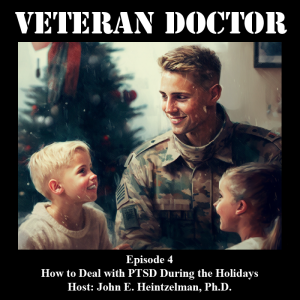
1.7K
Downloads
40
Episodes
This podcast is for anyone interested in Veteran-centric topics. Veterans have dedicated their lives to serving our country, so now it is our turn to serve them as they transition back into their civilian lives. One thing that has been discovered is that there is a lack of knowledge on the availability of resources and how to properly navigate the system upon exiting military service. This podcast's purpose is to help fill this gap of knowledge and guide veterans to the resources and information that they so deserve.
Episodes

Saturday Dec 26, 2020
Veteran Doctor - Episode 4 - How to Deal with PTSD During the Holidays
Saturday Dec 26, 2020
Saturday Dec 26, 2020
Good Morning Veterans, Family, Friends, and Everyone else who wants to listen in on the Veteran Doctor Podcast's FOURTH EPISODE. On this week's podcast, we will discuss how to deal with PTSD during the holidays.
Coping with PTSD can genuinely be difficult during the holidays. Many people sometimes feel the burdens of stress during this time of year. Typical holiday stress can cause you to experience PTSD-related symptoms such as overstimulation, depression, or anxiety. You can still learn coping strategies that can help you enjoy the holidays. Manage your PTSD carefully during the holiday season by planning ahead, finding creative and healthy ways to deal with stress, and choosing thoughtful visits with family and friends.
Planning Ahead
Have Realistic Expectations. Popular culture romanticizes that the holidays are a time when the world is perfect and everything right, but for many, the reality is very different. November and December can be an emotional and financially stressful time, especially if you are dealing with PTSD. Accept the fact that the holidays may never feel the same as it did before your trauma occurred, and do not expect that the holidays will make your stress, sadness, and negative memories go away.
- Ensure that you consider the triggers that may set off your physiological, mental, and behavioral reactions. These triggers might include being around certain people, crowded stores, lights, or other aspects of the holidays.
Talk To The People Who Are Close To You. Let your family and friends know why the holidays are difficult for you and what they can do to help you out. If any aspects of the holiday season may upset you, give them advance notice. Being honest can help your loved ones understand and know how to support you.
- Many people do not understand PTSD. If you do not explain how you are feeling to them, they may take it personally if you are not happy or do not want to celebrate.
- Talk to the people you trust. If a friend or a family member has a history of being unsupportive, consider why. Perhaps they simply do not understand PTSD. This can be potentially resolved by having a supportive family member or friend discuss the effects of PTSD on individuals during the holidays.
Think About Your Limits. You know yourself and your needs the best. Before the holidays, give some thought to what you can and cannot handle. Do not feel obligated to participate in any celebrations or rituals that will stress you out or bring back painful memories.
- It is not your responsibility to make other people happy at the cost of your mental health.
Communicate Your Boundaries to Others. Decide which events and traditions you can participate in during the holidays and which ones you would rather avoid. Consider factors like the event's duration, who will be there, and what you will be expected to do. Ensure that your family and friends know to eliminate any last-minute surprises.
- If you are uncomfortable telling someone why you will not be at a gathering, it is OK just to say you cannot make it.
Finding Coping Strategies
Know Your Triggers. Triggers are circumstances that aggravate PTSD symptoms, and they are usually different for everyone due to their individual experience and perception of their trauma. Anything can be a trigger, including people, dates, locations, sounds, and even smells. Being aware of your individual triggers will help you avoid them until you can develop coping strategies.
- If you are not sure of what your triggers are, keep track of the places, events, and patterns that make your PTSD symptoms worse. Log any notes in a journal to help you remember what to avoid or anticipate.
Use Grounding Techniques. Grounding is the practice of using focus and the physical world that surrounds you. It helps calm you down and prevent flashbacks in situations of stress. Showering, exercising, and holding a comforting object are several ways you can ground yourself.
- While at home, practice using grounding techniques when you feel anxious. Try splashing some water on your face, count to 20 slowly while taking deep breaths, or name the different smells, colors, or shapes you see in the environments around you. All of these techniques help you focus on your physical surroundings.
- You will quickly discover which ones work best for you at home or away in public.
Find Ways To Relax. Feeling physically or mentally stressed makes it challenging to cope with stressful stimuli. Let go of your stress by exercising relaxation techniques. Deep breathing, meditation, and muscle relaxation are techniques that can help you let go of your physical tension. To help relieve mental stress, try writing in a journal or meditating.
- Relaxation is very subjective to the individual who is experiencing it. Many feel it may translate to taking a lighting a scented candle, watching a fire, a 20-minute nap, or taking a relaxing bath. Choose a few different activities that you can do at home and on-the-go that can help you stay calm and relaxed.
- Relaxation techniques combat stress the best when they are used routinely. It is also helpful to create a stress-relief toolkit to take with you when visiting family, on vacation, or to employ the night before a big event at work.
- Meditation is a great way to help with relaxation, and it can even help your body release beneficial chemicals, such as oxytocin, endorphins, dopamine, and serotonin. The same chemicals that promote a sense of happiness and well-being. So, you may want to consider making meditation a part of your daily routine during the holidays too.
Volunteer Your Time. It is very therapeutic for many people with PTSD to spend part of their holiday helping other people who are having difficulties. Consider contributing your time at a soup kitchen, homeless shelter, or shelter for abused women.
- If you feel lonely or have lost your holiday spirit, you may find that volunteering may be incredibly beneficial.
Interacting with Friends and Family
Spend Time with People Who Support and Love You. When you are dealing with PTSD, social support can make a huge difference in how well your holidays end up. Seek out family and friends who try to understand your condition and care about you. Arrange your holiday schedule to minimize the amount of time you spend around unsupportive and stressful people.
Create New Rituals. If traditional holiday celebrations are painful or difficult, you can still find different ways to make the holidays meaningful. Develop a new tradition that let you honor the season without causing situations that trigger your past trauma. This will help you heal and come to appreciate the holidays all over again.
- New traditions could include volunteer work, new food, quiet one-on-one visits with friends and family, or rituals designed to give you closure from your trauma.
Bring A Grounding Activity to Family Gatherings. Family holiday parties can be noisy, crowded, and chaotic. To avoid becoming overwhelmed, bring something small to keep you active to help keep you centered and in the present moment.
- Try bringing a Rubik’s cube, a knitting project, a game, or a jigsaw puzzle.
Avoid Drinking Too Much Alcohol. When you are drunk, you might be in the state of mind to use the proper coping strategies in stressful situations. PTSD also puts you at an increased risk for alcohol addiction. Drink reasonably, or even better, avoid alcohol altogether.
- Additionally, alcohol interferes with SSRI medications, which are commonly prescribed for PTSD.
Take Breaks Often or Leave Early. If you start to feel anxious, do not hesitate to take a quick break. Find a quiet place where you can read, meditate, or breathe deeply for a few minutes. If you are still finding it difficult to relax, leaving early may be the best way to keep yourself from getting too anxious.
- If you are at a family gathering with your spouse, consider taking two cars so you can leave early, just in case if needed.

No comments yet. Be the first to say something!